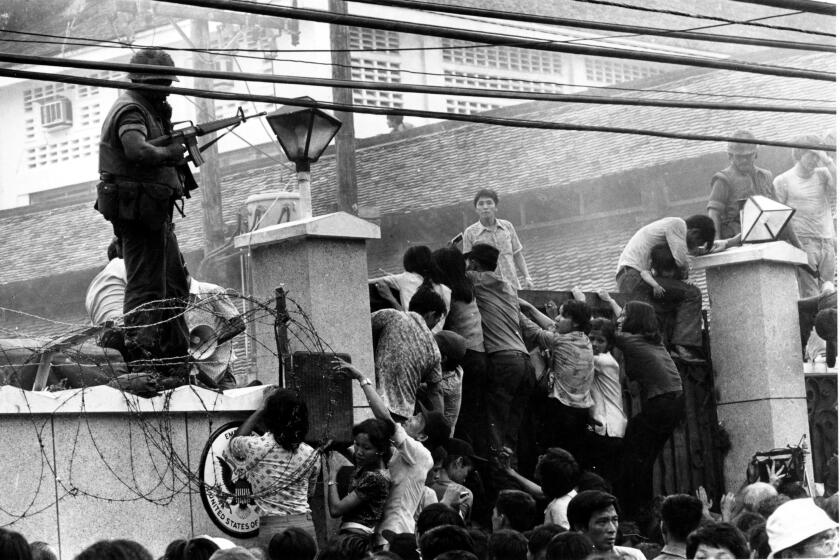Bush Hopeful on Holiday--and Summit : Superpowers: But the President tells Soviet television that he won’t ‘sweep under the rug’ the issue of Baltic republics.
President Bush offered a Memorial Day message of peace Sunday, saying, “That’s what this summit coming up with Gorbachev is all about.”
Bush added that during his three days of meetings with Soviet President Mikhail S. Gorbachev, he will try to convince him that “we don’t seek anything other than peace and prosperity for the people of the Soviet Union.”
At the same time, the President sent a strong signal that U.S.-Soviet relations will suffer over the Kremlin’s response to the Baltic republics’ efforts to gain independence.
Bush described the question of Lithuanian, Latvian and Estonian independence--opposed by Moscow--as a “troubling” matter “that I don’t want to sweep under this rug” during the summit.
“I have to have him understand the constraints on any U.S. President until self-determination is visible and forthcoming there,” Bush said.
He made his remarks in an interview with Soviet television commentator Valentin Zorin on Thursday in the White House family dining room. A transcript of the 10-minute interview was made public Sunday by the White House in Kennebunkport, where Bush is spending the Memorial Day weekend at his vacation home.
For Bush, it was a morning of church and an afternoon of golf, a day in which summit preparations decidedly took a back seat, at least in public. He is scheduled to return to Washington this afternoon to begin final summit preparations. Gorbachev is scheduled to arrive Wednesday evening in Washington, and the summit talks begin Thursday morning.
After a morning worship service at the First Congregational Church, Bush attended a brief service in memory of a local man killed in Vietnam in 1969. Asked afterward for his thoughts on the Memorial Day weekend before his meeting with Gorbachev, the President replied:
“Simply respect for those that gave their lives. . . . And recognition that . . . the world is getting smaller, and everybody, regardless of their faith and background, aspires to see a world at peace.”
In his interview on Soviet television, the President acknowledged differences between the two superpowers, but his emphasis was on cooperation.
“I’ve got grandchildren, and he’s got family, and we can talk about it as human beings. Hey, what are we going to do to make things a little safer? If we argue, we’ll do that pleasantly,” Bush said. “He’s a tough guy. Listen, I’ve been around him enough to know that he drives his point home. Well, I can do the same thing.”
Bush added: “I think it’s important that I level with him--here’s what’s in my heart, here’s our policy. I want you to understand it. I want you to understand that this policy has nothing to do with making things more difficult for the Soviet Union. Indeed, if you take my advice, sir, it will be much better for the Soviet Union. See, that’s the way I’ll do it.”
Bush said that he hopes to make progress at the summit on efforts to reach a treaty slashing the superpowers’ long-range nuclear arms. He will also strive to “get more progress” in the so-far slow-moving effort to achieve deep reductions in conventional arms in Europe and to reach “a breakthrough of sorts” in agreeing to deep cuts in the two nations’ chemical weapons arsenals.
In addition, he expressed hope about narrowing the differences on the North Atlantic Treaty Organization’s role in a unified Germany. The Soviet leader has threatened to pull the Soviets out of the conventional forces reduction talks if the West insists on East Germany’s pulling out of the Warsaw Pact and becoming part of NATO in a united Germany.
Asked about the state of his personal relationship with Gorbachev, with whom he last met in Malta in December, Bush said: “Wait until I see him and then I’ll be able to tell you, because he may be mad with me over some things because we do have some differences.”
He then added: “I think we have a personal relationship that’s good. . . . I’m confident we can have good, open discussions.”
More to Read
Get the L.A. Times Politics newsletter
Deeply reported insights into legislation, politics and policy from Sacramento, Washington and beyond. In your inbox three times per week.
You may occasionally receive promotional content from the Los Angeles Times.






